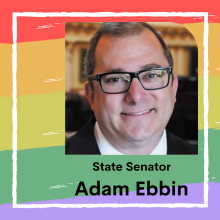
LGBTQIA+ History in Alexandria
LGBTQIA+ History in Alexandria

Alexandria was the first locality in Virginia to extend protections to gays and lesbians through its human rights ordinance. An owner of a gay bar in Alexandria successfully sued to overturn a Virginia law that had prohibited bars from selling alcohol to gays and lesbians. LGBTQIA+ History is Alexandria History.
Historic Resources
Alexandria's Queer History
Transgender History in Alexandria
- Out of the Attic- "Female Impersonators” of the early 20th century
- Out of the Attic- The remarkable visibility of Hannah Nokes
- Out of the Attic- Rev. Pauli Murray and her ties to Alexandria
LGBTQIA+ rights in Alexandria
Human Rights Ordinance

| From a June 7, 2022 social media post: Alexandria made LGBTQIA+ history on October 15, 1988. City Council approved a change in language to the City’s human rights ordinance to protect gays and lesbians from discrimination, becoming the first local jurisdiction in the Commonwealth to enact such a law. This ordinance passed with a 5-2 margin, including current member Del Pepper in the majority. Tune in next week to find out how this historic ordinance relates to country western dancing and the civil liberties of all Virginians! https://www.alexandriava.gov/HumanRights #HumanRightsCode |
This 1990 court case set the stage for challenging the 1934 law banning bars from serving gay people

| From a June 16, 2021 social media post: On June 6, 1990, two lesbians were kicked out of GW’s on King Street because they were dancing together - the Texas two-step to be specific. They filed a complaint with the City - after all, Alexandria had an ordinance to protect against this type of discrimination. They ultimately won the complaint and were issued an apology by the bar’s owner, but it illuminated a 1934 Virginia law that banned bars from serving gay people. This complaint opened the door for others to bring a court case challenging the 1934 law and in 1991, it was ruled unconstitutional. |
In 1991, French Quarter successfully overturned the 1934 law

|
In 1991, Murray Greenberg, owner of Alexandria’s French Quarter Café, and two other plaintiffs sued the office of Virginia Attorney General Mary Sue Terry. Terry’s office declined to contest the lawsuit, and so U.S. District Judge Albert V. Bryan, Jr. ruled in favor of Greenberg and his co-plaintiffs. Their victory was a big step forward for the LGBTQIA+ community in Virginia, overturning a 1934 law that prohibited the sale of alcohol to “homosexuals.” |
Mapping the Gay Guide
Out of the Attic- Mapping gay space in Northern Virginia
The first Alexandria Gay and Lesbian Pride Week- 1988

|
From a June 30, 2023 social media post: In 1988, three decades before the Alexandria Library first hosted its first Pride Fair in 2018, it welcomed a special exhibit for the first Alexandria Gay and Lesbian Pride Week. The Alexandria Gay Community Association (AGCA) worked with library staff on the exhibit “Gay Genius” which featured biographies of noted LGBTQIA+ individuals including Walt Whitman, Vita Sackville-West, Dag Hammarskjöld + Noël Coward. The display at the main library’s former location on Queen Street (now the Barrett Branch) also included the signed proclamation from the City designating June 11-17, 1988 as Alexandria Gay and Lesbian Pride Week. |
Parental rights

| From a June 16, 2023 social media post: In 1979, a judge in Rocky Mount, Va., severed a mother’s parental rights with her son because she was in a lesbian relationship. The ACLU took up the mother’s case + challenged the decision with a legal team that included Alexandria attorney Victor M. Glasberg, bringing Jane Doe v. John Doe + Ann Smith Doe before the Virginia Supreme Court. To support Jane Doe’s case, the ACLU of Virginia held a benefit concert featuring feminist singer Meg Christian at what was then T.C. Williams High School on March 30, 1980. On December 4, 1981, more than two years after agreeing to hear the case, the Virginia Supreme Court ruled 5-2 in favor of Jane Doe + overturned the lower court’s decision. Although the court did not condone the mother’s conduct, its landmark decision determined that a parent’s sexual orientation alone did not make them “an unfit parent.” |
Adam Ebbin

|
|
